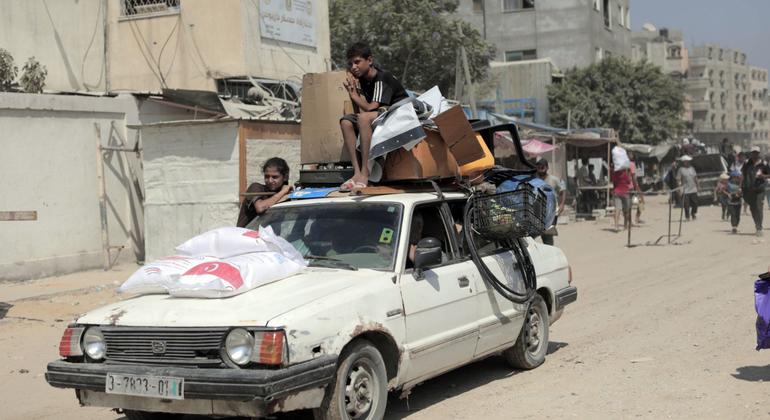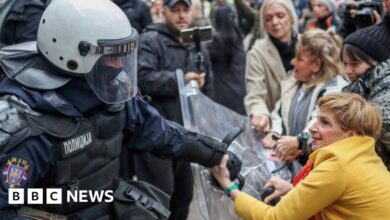Humanitarian efforts ‘fall short of desired targets’ after 300 days of war in Gaza


Andrea De Domenico spoke from Jerusalem during his final press conference with journalists at the United Nations Headquarters in New York as Israeli authorities have yet to renew his visa.
Recalling his time in the area, Mr. De Domenico recalled that the previous UN Secretary-General had said that Gaza was becoming a graveyard for children and “unfortunately, he was right, and this is the reality in Gaza.”
The international community “must answer the question of how much human suffering can be tolerated in the name of security,” he said.
‘Systematic dehumanization of civilians’
Mr De Domenico said that over the past 10 months he had witnessed “systematic dehumanization of civilians” in both Gaza and the West Bank, and “the physical and mental exhaustion of entire populations”.
He also voiced concern about “growing anger against Israel, awakening dark forces that can fuel anti-Semitism,” noting that the United Nations continues to call on all leaders to speak out against anti-Semitism, anti-Muslim bigotry and hate speech, which only serve to increase stigma and discrimination.
The top humanitarian said it was “coincidental” that his final press conference came on the eve of the 300-day mark.
The war broke out in response to Hamas-led terrorist attacks in southern Israel on October 7, 2023, which killed about 1,250 people. More than 250 people were taken hostage in Gaza, and 115 remain in the enclave.
Death and destruction are on the rise
Mr De Domenico said recent weeks had seen more evacuation orders in Gaza, causing more displacement, and that it was “particularly worrying” that they affected areas that Israel had unilaterally declared safe zones.
More than 200,000 people have been displaced but spontaneous repatriations have taken place in the past few days.
“And we will continue to try to respond to people in those areas,” he said. “But the fact remains that our capacity has never scaled up.”
Meanwhile, the war’s death toll continues to mount. More than 39,000 people in Gaza have been killed, 91,000 injured, 90 percent of the population – 1.9 million people – have been displaced, and 60 percent of residential buildings have been destroyed, with an estimated 49 million tons of debris created.
Furthermore, food insecurity is at an all-time high and polio has recently been detected in wastewater samples.
“We do a lot of work in this environment,” he said. “We provide people with water, food, tents, clothing, hygiene kits, nutritional supplements, and cash. We equip hospitals with stretchers, medicines, meals, and medical evacuation facilities.”
However, he said “all these efforts have not yet achieved the goal of helping people”, stressing the need to scale up operations.
He also pointed to “glimmers of hope”, such as the start that day of a programme providing informal learning for some 30,000 children, which is being run by UNRWAUnited Nations agency assisting Palestine refugees and the United Nations Children’s Fund (UNICEF)
West Bank violence
Mr. De Domenico also mentioned the situation in the West Bank, where the United Nations has verified the killing of 572 Palestinians, including 141 children, since October 7. Most were shot by Israeli forces and settlers. Fourteen Israelis have been killed in the same period.
Demolitions also continued, and now appear to be “widespread and affecting homes in areas that have been untouched for years.” In total, more than 1,300 structures have been demolished, nearly 40 percent of which were occupied, displacing nearly 3,000 people.
At the same time, search and rescue operations “are becoming more frequent” and “appear more like military operations than police law enforcement,” resulting in “massive damage to civilian infrastructure.
“For example, we have seen streets completely destroyed and sewage systems destroyed, and of course that affects public health.”
He also reported that the Israeli military’s “attitude” toward humanitarian operations was also becoming more aggressive.
“We were systematically stopped at checkpoints and identified. They asked staff to get out of their cars, take their keys. They wanted to identify each staff member and it seemed like this was a growing trend.”
Lack of permits and visas for staff is also becoming a problem for international NGOs in the West Bank.
When asked about his situation, Mr. De Dominico said that previously the visa was issued for a period of one year and after the war started, the period was shortened to three to six months.
He was recently given a one-month extension and was warned that the extension would not be renewed.
“The last straw was the release of the UN Children and Armed Conflict report, and they alluded to the longstanding problem with reporting that OCHA have been doing,” he said.
“But this was only communicated verbally and I have not received any official notification, despite repeated requests.”




